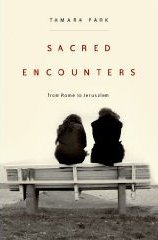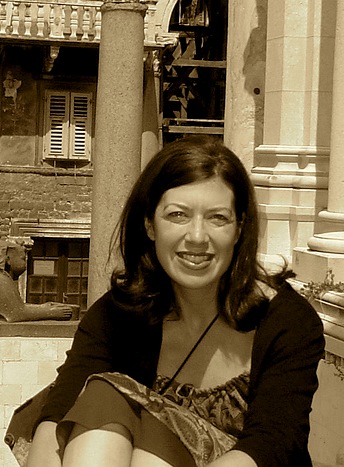By Jeff Goins, Editor
Tamara Park is author of Sacred Encounters: From Rome to Jerusalem. She . Here’s an interview she did with Wrecked about her journey of discovery:
Can you share a little bit about how you were led to go on a pilgrimage from Rome to Jerusalem?
 Travel happens to be my favorite classroom and conversations my teachers of choice. So when some questions and desires started clanging around inside of me, I knew I needed to hit the road. A pilgrimage from Rome to Jerusalem seemed to be the best way to sort out my questions.
Travel happens to be my favorite classroom and conversations my teachers of choice. So when some questions and desires started clanging around inside of me, I knew I needed to hit the road. A pilgrimage from Rome to Jerusalem seemed to be the best way to sort out my questions.
I moved to Jerusalem in the summer of 2001 to study. I was taking Modern Middle East Politics, Geology, Archeology, and other courses. Then 9/11 broke the world calendar apart, as Israelis and Palestinians played out their own entangled conflict.
In the midst of the Intifada, Palestinian uprising, my school closed down. So, I rented a flat in a Palestinian neighborhood in the Old City of Jerusalem and I took Hebrew classes in the new city. I volunteered with Bedouin children through a group called Rabbis for Human Rights as well as got to regularly spend time with gypsy kids, the Greek Archbishop, the Syrian muktar as well as other intriguing characters.
During that time I saw how political divisions took on concrete human consequences. Because ambulances in the West Bank had a difficult time getting through Israeli checkpoints, the still birth rate of Palestinian babies had skyrocketed. And due to repeated bombings in Israeli neighborhoods, teenagers were cooped up in houses and an increased number were spending time smoking pot in their basements. And yet, I witnessed this: people with hearty resolve and innovation crossing their ethnic, political, and religious bounds to pursue peace.
Living in the midst of this mlange of cultures and ethnicities, my American sensibilities and my view of God were challenged and stretched. Who was this God who chose to grow up in the East? What do ancient traditions have to say to my spinning postmodern perspectives? What does a God of peace offer to war-torn peoples? I felt like I was just discovering the questions I needed to ask about God when I had to return to the States.
So with those questions in tow and with my penchant for travel, the idea of the pilgrimage formed. And I was fortunate to have two fabulous friends who were game to go with me.
Why do you think it is important for followers of Jesus to go o n their own spiritual journeys?
I suspect there are stacks of reasons for its importance, but here are three that come to mind.
 We have an earthy faith. We have a God who refuses to remove Himself from the physical. The Divine blows breath into humanity, hurls bread from heaven, consecrates wine, and then wraps Himself in skin. Symbolism saturates our Scripture-and physical images and acts reveal spiritual truths. Our hikes, our backpacking, our pilgrimages can potently remind us that life rarely comes with instant insights, with straight-lined conclusions, but rather we trek through this life with God in an ongoing conversation about being lost, or being bored, or being overwhelmed by beauty. And, hopefully we learn to listen to God as well. Traveling can be one of the best ways to learn to listen.
We have an earthy faith. We have a God who refuses to remove Himself from the physical. The Divine blows breath into humanity, hurls bread from heaven, consecrates wine, and then wraps Himself in skin. Symbolism saturates our Scripture-and physical images and acts reveal spiritual truths. Our hikes, our backpacking, our pilgrimages can potently remind us that life rarely comes with instant insights, with straight-lined conclusions, but rather we trek through this life with God in an ongoing conversation about being lost, or being bored, or being overwhelmed by beauty. And, hopefully we learn to listen to God as well. Traveling can be one of the best ways to learn to listen.
We join the ancients when we sojourn. Chunks of Scripture read like a travelogue. Most of the Hebrew prophets that followed were on the move. The Wisdom literature repeatedly refers to God directing one’s path. And if you look at the Gospels, Jesus was only a little over a week old when He made His first pilgrimage to Jerusalem. Jesus continued the practice of pilgrimage into His ministry. Travel for the sake of the holy was valued by the early church and beyond.
We have the opportunity to declare our dependence when we travel. Lots can go wrong when you travel, and lots often does go wrong. Our seductive illusions of control get the opportunity to be shattered more easily on the road. We are forced to rely on people and our Creator en route. And in the reliance, we experience the wonder of hospitality, the mystery of receiving, the sturdiness of Immanuel, God who is with us.
What is it about traveling that brings out the more introspective sides of people? Why can’t we learn the same lessons from a pilgrimage while sitting in front of our computers, checking our facebook friends’ statuses?
When I travel I live more attached to my own body-my nose smells new scents, my feet hurt in new ways, my eyes get surprised by new sights.
We live in such a virtual world-watching reality TV, rather than going on our own bad dates or playing Rockband on our Wii instead of callusing our fingers on our old guitar. When you travel you take no proxy. It’s you in your body, getting to react to a wave in Costa Rica, or a pyramid in Egypt, or a glacier in Alaska. And because of that, I think our thoughts become more grounded.
Traveling also heightens my sense of living in story. The various backdrops bring new or intensified aspects out of my character. I get glimpses of who I am in relation to Mount Kilimanjaro, or a street kid in London, or a sunset in Montana. I get to understand more of my American distinctives when I visit different cultures. I see how my Protestant roots have shaped me when I worship with Catholics or Orthodox believers. In all this, my understanding of my story, and hopefully the larger Story of God’s creation and pursuit of all, becomes more vivid and robust.
What was the main insight from your own journey from Rome to Jerusalem? If you could only take away one lesson, what would it have been?
Learning to receive. Every day on the journey I had to be poised to receive from strangers-receiving their descriptions of God, their life stories, gifts, and offers of hospitality. This extravagant generosity wrecked my sense of equilibrium.
Admittedly I’ve lived with a passion for parity. I’ve not wanted to be ripped off and even more so I’ve desired not to owe anyone. I’ve embraced an American sensibility: “You have what you earn and you earn what you have.”
My unstated worldview was not only exposed, but it also was revealed as an imposter. I had no way of making my relationships on this trip fit into my little equality box. And even more impossible was to squeeze God into my equations. God was the ultimate host, extravagant in His love. There was no way I could pay back the gift and sacrifice of His Son. All I could do was receive.
You traveled through a lot of different cultures, and asked a lot of different people about who God was to them. Did you find that a person’s perception of the divine changed, depending on the culture and history of a specific area? If so, can you give an example?
Yes. I believe context certainly influences our understandings of the Divine. A monk in Florence described Jesus’ perfection by showing me the architecture of his
church. A priest in Meteora, Greece, explained to me the mystery of God’s mercy and judgment by walking me through a fresco.
And in conflict-stained Sarajevo, a few people I met connected their views of God (or lack of belief in God) with the actions of those who claimed to be religious. I found that sentiment in several cities that had experienced war-people’s understanding of God was tied to how the religious community practically lived out their faith during times of crisis.
Are you working on any other writing projects? For anyone wanting to know more about you – your writings, ministry, etc. – how can they find out?
I’m doing a blog for Neue and working on other articles. I just returned from a trip from Africa, so I’m sorting out stories from that adventure. People can also visit tamarapark.com or find me on Facebook.
If you had to choose between eating sushi pizza or pizza-flavored sushi, what would it be?
Pizza-flavored sushi. Definitely. And yes, I have my reasons.
 Jeff graduated from Illinois College, a small liberal arts school, with a degree in Spanish and Religion. He lives in Nashville, TN. He works for Adventures in Missions, edits this silly little magazine, and loves to do new things. He just got married in January. Check out his blog: Pilgrimage of the Heart.
Jeff graduated from Illinois College, a small liberal arts school, with a degree in Spanish and Religion. He lives in Nashville, TN. He works for Adventures in Missions, edits this silly little magazine, and loves to do new things. He just got married in January. Check out his blog: Pilgrimage of the Heart.
